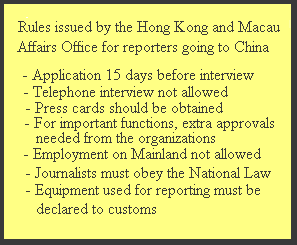Journalists tell of the difficulties in reporting under pressure
By Vivian Lai
 J
ournalists hindered by Public Security Bureau officers find newsgathering in China more challenging —even shocking — when compared to their experiences elsewhere.
J
ournalists hindered by Public Security Bureau officers find newsgathering in China more challenging —even shocking — when compared to their experiences elsewhere.Ms Kari Huus of the Far Eastern Economic Review has been reporting news in China for six years and has lived in Beijing for four years. As a journalist reporting mostly economic news, she finds that there are great difficulties in gathering news in China.
“There is a whole system for controlling journalists. If journalists want to do interviews in China, they have to apply for approvals beforehand through the Xinhua News Agency,” said Ms Huus.
Local journalist Cheung Kit Fung said, “Before 1989, journalists did not have to ask for approvals before gathering news in China. The Chinese government had no idea of what kind of news should not go out for public consumption. Therefore, it was not a usual practice for journalists to be stopped by Public Security Bureau officers.
“However, since the June Fourth Incident in 1989, the Hong Kong and Macau Affairs Office has announced seven regulations that require journalists to have approvals before reporting news in China. Not all the journalists from the same company get approvals.”
According to Miss Cheung, journalists have to state clearly who is going to be interviewed and what the subject matter will be. The requests are then submitted to the Foreign Affairs Office.
She said,“The Chinese government has absolute power on deciding whether to give approvals or not. Journalists are totally helpless and passive in this matter.”
This was echoed by Ms Huus: “It is not easy for journalists to get approvals for reporting in Xinjiang Uygur Autonomous Region or Heilongjiang Province. Also, you can hardly arrange an interview with officials in the Hong Kong and Macau Affairs Office. They always say that everything is already in the newspapers and they are unwilling to talk to reporters.
“Normally journalists do not get into much trouble if they report news without a permit. Yet, if the topic covered is sensitive, the journalists may have problems,” said Ms Huus.
“What’s more, journalists never know what kind of topic is sensitive because the Chinese government never states which aspects of government affairs cannot be disclosed. Issues like national security in China can be regarded as sensitive,” she continued.
Ms Huus said there is no official department for journalists to verify information. Journalists can’t verify information directly with the person concerned.
“If the credibility of news cannot be ensured, the journalists’ duty to report the truth is compromised,” she said.
In China, the government does not encourage people to talk to the press.
“A lot of people hesitate to talk to journalists. They may fear that their words are being recorded by the government. Their willingness to be interviewed depends on the relationship between the topic discussed and their status.
“For example, if you ask a farmer something about inflation, there’s no problem. But if you want to talk with a top executive, he may find it inappropriate to discuss the matter openly, as it is a sensitive topic for someone in his position.
“Chinese people never know how they will be punished if they say something inappropriate. Even if they are unlikely to be arrested, they will surely get into trouble.
“The telecommunications network is not well enough equipped in China. People feel that it’s too unsafe to talk on phones because they are worried someone will be listening to their conversation. Therefore, people in China are reluctant to talk on phones,” said Ms Huus.
Ms Huus was hindered by Public Security Bureau officers while gathering news at the United Nation Women’s Conference in Beijing earlier this year. She said she was not frightened, but was irritated by it. Indeed, the event encouraged her to report in China.
Despite the difficulties, Miss Cheung said there would not be drastic changes in newsgathering in Hong Kong after 1997.
“As 1997 approaches, we probably will have less freedom of speech. However, I don’t think Hong Kong journalists will practise self-censorship.
“The crux of the matter depends on the attitude of editors and newspaper owners. It’s not the journalists’ but the editors’ duty to
decide what news should be published. They will zip their mouths shut if they think that their profits will be reduced,”
she concluded.



